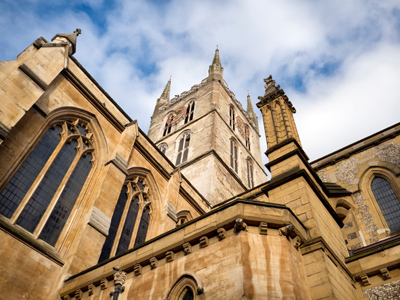

Christianity - The Church
This GCSE RE quiz takes on 'The Church' ~ which, in its huge variety, is one of the most widespread institutions on the face of the earth. It effectively began on the first Whit Sunday (‘Pentecost’, as the Jews present then knew it) and was enthusiastically grown and spread around the eastern shores of the Mediterranean, not least by the tireless missionary and correspondent St Paul (formerly Saul of Tarsus).
Its creeds and scriptures were mostly debated and codified by believers over the following few centuries, and the catholic church was governed by a succession of popes in a tradition that reached back to Jesus’ commission to the disciple Peter (‘Peter’ itself being a nickname: he was originally called Simon, but Jesus referred to him as ‘the rock upon which I shall build my church’, even after Peter had shown himself to be an impulsive and fallible follower).
'A library always has (windows, lamps, books, silence, tables).'
The appropriate answer would have been 'books', since without these, it would hardly be worthy of the name; each of the other items is important, but less essentially characteristic.
Now, bearing in mind how widely churches and their customs and traditions vary, which of the following would you have picked as the strongest distinctive common feature ~ if you had been set a similar question along the lines of 'A church has ...'?
'A church will always have (pick only ONE) ... '
Answer 2: Not all churches struggle to raise funds to maintain and enhance their premises, and/or to support good works of charity etc. ... but far more of them do, than not.
Answer 3: Sadly, small churches sometimes see the numbers in their faith-community dwindle to a point where continuing is no longer viable. In such a case their building may lie empty or be deconsecrated and used for other purposes, else even demolished. But it is possible for 'a church' (in the sense, probably, of distinctive purpose-built premises) to exist without anyone attending it.
Answer 4: In the days of the 'underground churches' (meeting secretly under persecution by Communist authorities, for instance) there might not have been an actual complete copy of the Scriptures available. But in any other circumstances, what would be the value of a church without at least one Bible for public reading and encouragement?
Most parts of The Church (in its more general sense) meanwhile continue to grapple with major lifestyle and demographic concerns, seeking to discern how God is calling them to respond. Which of the following have been more modern principal challenges?
Ready for more?
not all...
quizzers. Try to win a coveted spot on our Hall of Fame Page.






